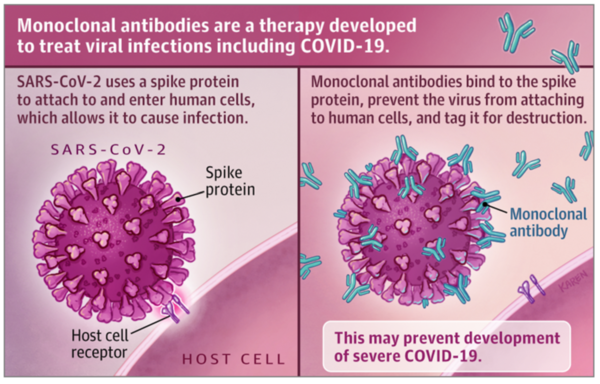Monoclonal antibodies, designed to mimic the body's natural immune response, are available as treatment for COVID-19 for patients at high risk of progression to severe disease.
There are several approved treatments for coronavirus disease 2019 (COVID-19) in hospitalized patients but few for patients who are not sick enough to be hospitalized. Monoclonal antibodies are a new treatment for outpatients with COVID-19 who are at risk of progression to severe disease.
An antibody is a protein that is naturally produced by the immune system in response to an infection. A monoclonal antibody is a molecule developed in a laboratory that is designed to mimic or enhance the body's natural immune system response against an invader, such as cancer or an infection. Monoclonal antibodies have an advantage over other types of treatment for infection because they are created to specifically target an essential part of the infectious process. A monoclonal antibody is created by exposing a white blood cell to a particular viral protein, which is then cloned to mass produce antibodies to target that virus. Prior to COVID-19, monoclonal antibodies were developed to treat several viral infections, such as Ebola and rabies.
Severe acute respiratory syndrome coronavirus 2 (SARS-CoV-2) has a spike protein on its surface that helps the virus attach and enter human cells. Several monoclonal antibodies have been developed to bind to the spike protein of SARS-CoV-2 and block the virus from invading human cells. Patients with COVID-19 may receive an intravenous (IV) infusion of a monoclonal antibody, usually in an emergency department, an infusion center, or another outpatient setting (such as the patient's home or a nursing home).
New variants of the SARS-CoV-2 virus have recently been detected. These variants emerge because of mutations in the genome of the virus. Monoclonal antibodies remain effective against the new SARS-CoV-2 variant called B.1.1.7 (first reported in the United Kingdom). However, some mutations may cause changes in the spike protein that could interfere with the effectiveness of currently available monoclonal antibodies.
Some patients could experience either an allergic or nonallergic infusion-related reaction. Both reactions are due to activation of the immune system in response to the antibody but occur in different ways. Infusion-related reactions seem to be rare but can cause flushing, itching, shortness of breath, or low blood pressure. There are also potential side effects of receiving any IV medication, including pain, soreness, or bruising around the IV site.
Currently, 2 monoclonal antibody products are being used to treat COVID-19 through a US Food and Drug Administration (FDA) Emergency Use Authorization. Although researchers are still learning which patients with COVID-19 are most likely to benefit from monoclonal antibody therapy, early data suggest greater benefit in high-risk patients, including those older than 65 years, with a suppressed immune system, or with certain medical conditions including obesity. Monoclonal antibodies are intended for patients recently diagnosed as having COVID-19 who are not sick enough to be in the hospital but who have some risk factors for severe infection. Giving the infusion as early as possible in the course of infection is important, so patients should seek medical care and testing as soon as they develop symptoms.
体内の自然免疫反応を模倣するように設計されたモノクローナル抗体は、重症化のリスクが高い患者のCOVID-19に対する治療薬として利用可能である。
入院患者のCOVID-19に対する治療法として承認されているものはいくつかあるが、入院するほどの病気ではない患者に対する治療法はほとんどない。モノクローナル抗体は、重症化のリスクがあるCOVID-19の外来患者を対象とした新しい治療法である。
抗体は、感染症に反応して免疫系によって自然に産生されるタンパク質である。モノクローナル抗体は、研究室で開発された分子で、がんや感染症などの侵入者に対する体の自然免疫系の反応を模倣したり、増強したりするように設計されている。モノクローナル抗体は、感染プロセスの本質的な部分を特異的に標的とするように作られているため、他のタイプの感染症治療に比べて優位性がある。モノクローナル抗体は、白血球を特定のウイルス蛋白質に曝露することにより作製され、それをクローン化して、そのウイルスを標的とする抗体を大量に作製する。COVID-19以前には、エボラや狂犬病など、いくつかのウイルス感染症を治療するためにモノクローナル抗体が開発されていた。
重症急性呼吸器症候群コロナウイルス2(SARS-CoV-2)は、ウイルスがヒト細胞に付着して侵入するのを助けるスパイクタンパク質をその表面に持っている。SARS-CoV-2のスパイク蛋白質に結合し、ウイルスがヒト細胞に侵入するのをブロックするために、いくつかのモノクローナル抗体が開発されている。COVID-19の患者は、通常、救急科、輸液センター、または別の外来(患者の自宅や介護施設など)で、モノクローナル抗体の静脈内注入(IV)を受けることができる。
SARS-CoV-2 ウイルスの新しい変異体が最近検出された。これらの変異体は、ウイルスのゲノムに変異があるために出現する。モノクローナル抗体は、B.1.1.1.7(英国で最初に報告された)と呼ばれる新しいSARS-CoV-2変異体に対して有効であることに変わりはない。しかし、いくつかの変異によりスパイク蛋白質に変化が生じ、現在利用可能なモノクローナル抗体の有効性を阻害する可能性がある。
患者の中には、アレルギー性および非アレルギー性の輸液関連反応を経験する人もいる。どちらの反応も、抗体に反応して免疫系が活性化されることによるものであるが、異なる方法で起こる。輸液関連反応はまれなようだが、顔面紅潮、かゆみ、息切れ、低血圧などを引き起こす可能性がある。また、痛み、または点滴部位周辺の打撲など、点滴薬の投与を受けることによる潜在的な副作用もある。
現在、2種類のモノクローナル抗体製剤が、米国食品医薬品局(FDA)の緊急使用許可を受けてCOVID-19の治療に使用されている。COVID-19のどの患者がモノクローナル抗体治療の恩恵を受ける可能性が高いかについては、研究者の間ではまだ研究が進んでいないが、初期のデータでは、65歳以上の高齢者、免疫系が抑制されている患者、肥満を含む特定の病状を持つ患者など、リスクの高い患者において、より大きな効果が得られることが示唆されている。モノクローナル抗体は、最近COVID-19と診断された患者で、病院に入院するほどの病気ではないが、重篤な感染症の危険因子を有する患者を対象としている。感染の経過の中で可能な限り早期に輸液を行うことが重要であるため、患者は症状が出たらすぐに医療機関を受診し、検査を受ける必要がある。

https://jamanetwork.com/journals/jama/fullarticle/2776307